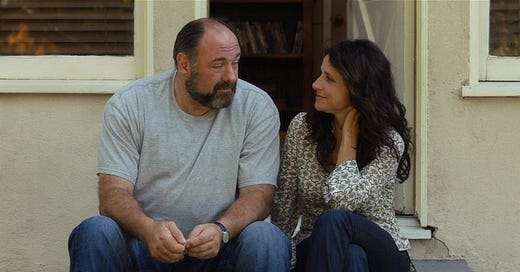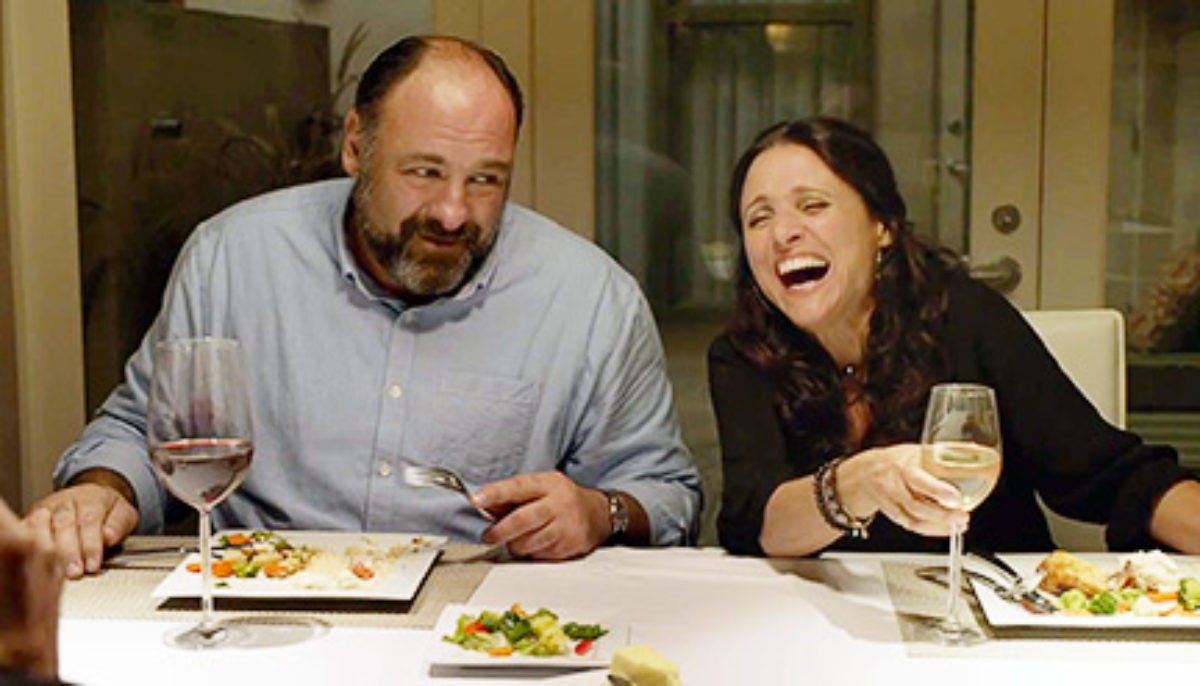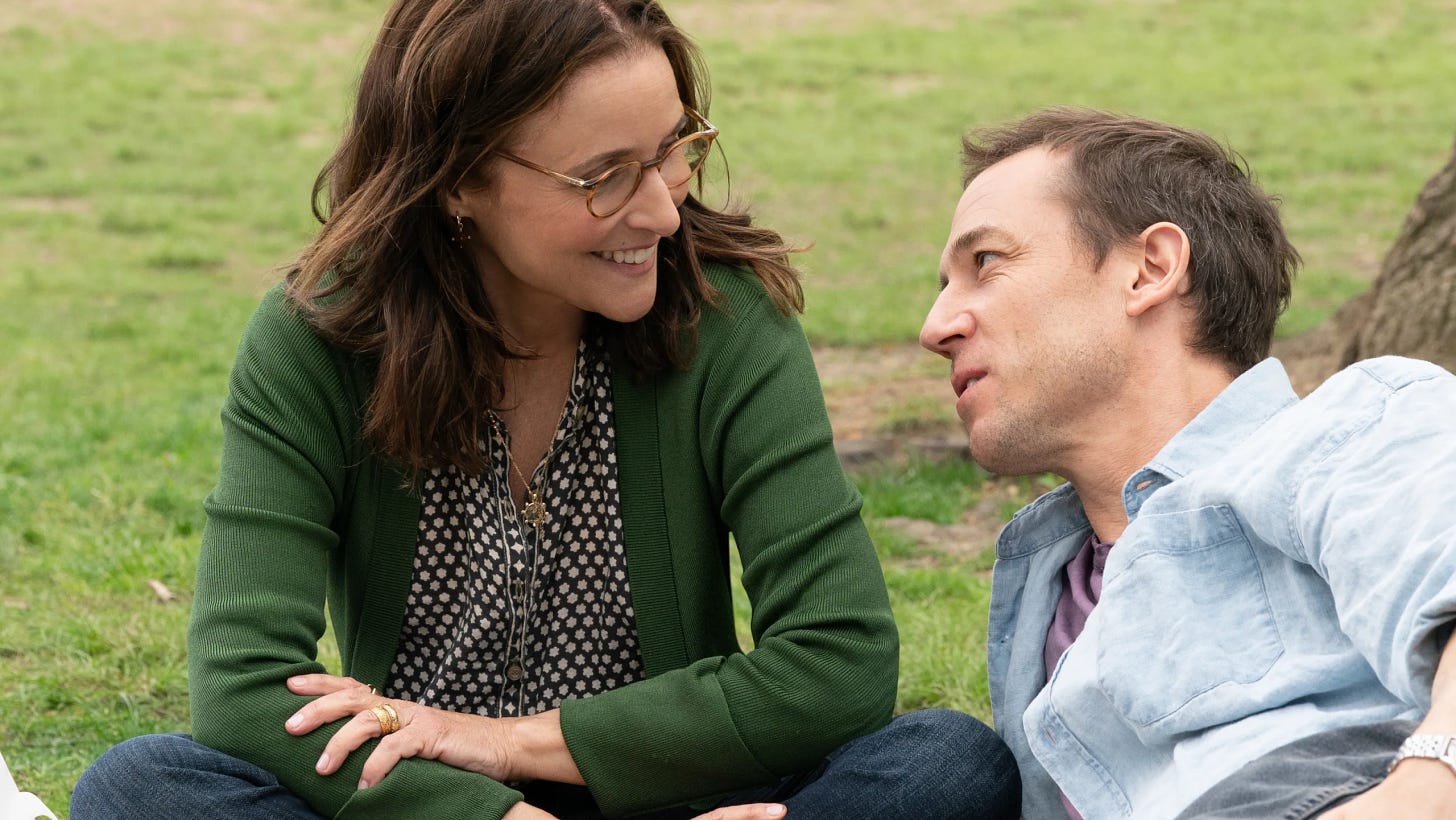The Second Acts of Nicole Holofcener and Julia Louis-Dreyfus
With 'Enough Said' and 'You Hurt My Feelings,' the director and actress have charted a course through the anxieties of middle age.
“Our middle-agedness is comforting and sexy to me.”
That’s Julia Louis-Dreyfus as Eva in Nicole Holofcener’s Enough Said, a romantic comedy that recalibrates the rules of the genre around the ages of its participants. As a writer-director, Holofcener tends to organize her work around themes rather than twisty machinations of plot. You’d have an easier time describing Lovely & Amazing, for example, as an ensemble piece about women’s self-esteem, or Please Give as a comedy about money and guilt than some more graspable logline. But while Enough Said isn’t about a 13-year-old occupying a 30-year-old’s body or a man having 50 first dates with an amnesiac, it does have the closest thing to a high-concept hook that Holofcener can manage: Eva is a divorced massage therapist who happens to be dating the ex-husband of a new client. Let the rom-com zaniness commence!
Except the rom-com zaniness never really commences, other than a scene in which Eva has to duck behind some foliage to keep from getting recognized. The deeper purpose of Holofcener’s premise is to explore the specific wariness of middle-aged, been-there-done-that types welcoming new love into their lives. Most rom-com heroines are at least a couple of decades younger and open to whatever serendipity or quirky behavior the universe might have in store for them. Eva might have felt like one of those heroines many years ago, but now she’s divorced and so is the man she’s dating, and she’s too filled with self-doubt to follow her instincts. After all, she fell in love and got married before, and that didn’t work out as she’d hoped. Same with him. So even though she finds him a warm, funny, surprisingly sexy man, she’s asking herself two obvious questions: What’s wrong with him? And what’s wrong with me?
Holofcener and Louis-Dreyfus’ superb new movie, You Hurt My Feelings, is also about the doubt that can creep into a seemingly contented middle-aged relationship, but it happens within a marriage this time. Here, Louis-Dreyfus stars as Beth, a writer who discovers that her husband, who’s offered unmitigated support through multiple drafts of her first novel, doesn’t really like the book. It’s an impossibly difficult situation for Beth, because his white lies feel like a breach of trust, when really they were his earnest attempt at offering her support. The compelling part of this premise is that his opinion of her book cannot be retracted. He cannot convince her that no, really, he likes it. Naturally, it wounds her already-wavering confidence and shakes the foundation of their marriage. Where will they go from here?
With their two films together, Holofcener and Louis-Dreyfus have made comedies about dilemmas specific to middle age, when people’s lives have calcified to the point where change doesn’t seem possible—or, if it’s possible, then it’s to be treated with the utmost suspicion. The word for that sort of concern is “neurotic,” which is why Holofcener’s urban comedies tend to be associated with Woody Allen’s. (Another reason is that Holofcener’s stepfather, Charles H. Joffe, has produced or executive-produced most of Allen’s films, starting all the way back to Take the Money and Run.) But to state the obvious, Holofcener writes from a woman’s perspective and the neuroses that run through her films are not personality traits in the same way they are with Allen and his various on-screen surrogates. Her characters are much more active in squaring up to their problems, and Holofcener is much more hopeful that they can do it. The beauty of Enough Said and You Hurt My Feelings is that their suggestion that “middle-agedness” can be comforting and sexy, and meaningful change is possible.
***
From Holofcener’s first feature, Walking and Talking, Catherine Keener had served as the filmmaker’s primary actress, embodying the comic prickliness that underscores much of her work. Keener plays the Keener role again in Enough Said as Marianne, a poet whose candor delights Eva long before she discovers the ex-husband Marianne likes to gripe about happens to be Albert (James Gandolfini), the new man she’s dating. But Louis-Dreyfus brings a different dynamic to Holofcener’s films, more breezily comedic, as you’d expect from the funniest of the Seinfeld quartet and the star of HBO’s Vice, but also a little gentler and more vulnerable. In a film like Lovely & Amazing, Keener could play the type of person to say “fuck off” to a shop owner disinterested in her homemade tchotchkes; Louis-Dreyfus’s characters are warier about confrontation, and passive in ways that oftentimes bite them in the ass.
The ironic thrust of Enough Said is that Eva lucks into a romance with a man she really likes and winds up doing everything she can to sabotage it. Though Albert is not exactly the type of mate she’d have ordered up from a catalog—he is self-evidently overweight and a bit of slob—he’s a surprisingly great fit for her, with a serene and engaging personality, and a great sense of humor. Whatever soft, vulnerable edges danced around the Tony Soprano character on The Sopranos—those qualities that made him an irresistible client to his therapist and not least to us—are brought to the surface by Gandolfini, in one of his last and greatest performances. (He died after the film was finished but before it was released.) Albert’s flaws are relatively minor. They’re only major if you deliberately choose to amplify them. Which is exactly what Eva does.
Though Eva meets Albert and Marianne at the same party, she doesn’t make the connection until she’s started dating one and befriended the other. And the dirt she gets from Marianne on Albert are standard-issue petty irritants, though there are a lot of them: He loves guacamole but hates red onions, so he separates out the avocado by swirling his chips. He doesn’t have end tables in his bedroom, so his stuff tends to get strewn all over the floor. He’s a little clumsy in bed. He talks about losing weight, but winds up falling back into bad eating habits. He makes a mean eggplant and mozzarella pasta, but that’s all he knows how to cook. Albert is an imperfect person, but none of these are deal-breakers.
Holofcener’s main insight in Enough Said is that Eva, like many divorced people (or people who have ended long-term partnerships), have trouble seeing a romantic future that doesn’t end in heartbreak. She likes Marianne and Albert a great deal. Why didn’t that work? Her own ex-husband is a nice guy who has helped raise their daughter to a lovely college-age woman, just like Marianne and Albert did. What if that didn’t work, either? There’s a scene in Enough Said where Eva’s daughter is puzzled to find that her mother has been leafing through old wedding photos. Eva tells her she wanted to see if she knew back then what they’d fight about later. “I think I always knew,” she says. “And felt them. I just wasn’t paying attention.”
Eva’s abundance of caution leads to the inevitable scene where Albert and Marianne discover her deception simultaneously and all three have their hearts broken unnecessarily. That’s the closest Holofcener can manage to a screwball payoff, though it’s not a funny moment for anyone. Yet Eva needs to get to a place where she realizes that her relationship with Albert is distinct from Marianne’s, and the habits that gnawed at Marianne during their marriage might not bother her in the same way. For a middle-aged person, that’s a bigger leap than it seems to be, even if you’re more accepting of imperfections in yourself and others. The gorgeous coda of Enough Said, where Albert and Eva reunite on his front porch, leads to a joke about his bedroom end tables. He still doesn’t have any. They can laugh about it now.
***
The happily married couple in You Hurt My Feelings has the opposite problem of Eva and Albert in Enough Said: If anything bothers one of them about the other, they’re not inclined to speak up about it. That works for Beth and Don (Tobias Menzies), because they’re compatible partners and it never seems worth rocking the boat. At their anniversary dinner, Don gives Beth a variation on the same pair of gold-leaf earrings that he’s been gifting her for years, and she gives him the same V-neck cashmere sweater that he doesn’t wear. Though it may indicate a lack of attentiveness on both their parts, it also represents the pleasing, frictionless nature of their relationship. They obviously love each other. They still share food, even ice cream cones. And it’s just easier not to let the little things bother them.
Holofcener winds up turning the question of Enough Said on its head. In that film, Louis-Dreyfus plays a woman whose thinking is clouded by a mate’s potentially irreconcilable flaws. Here, she wonders whether ignoring flaws can be as damaging as overemphasizing them. When Don pushed past his personal disappointment over Beth’s novel and encouraged her through draft after draft, he was playing the role of supportive husband. That’s the easiest route for him to take, no doubt, but there’s a good argument for doing it, too: Why would Beth need her husband for literary criticism when she’s having to battle against her own self-doubt and the distressing signals she’s been getting from her agent and the publishing world? Her last book, a memoir, was politely received but unsuccessful. She needs all the encouragement she can get.
Or does she?
You Hurt My Feelings is a semi-deceptive title, because Beth’s feelings are not hurt intentionally. You could just as well call the film You Spared My Feelings. (A title that just got me fired from my imaginary studio executive job.) Beth initially believes that Don has been lying to her, but those feelings are wrapped up in the more common fragility of being a writer and having your ego chipped away by criticism or commercial disappointment. But having Don’s reservations about Beth’s novel out in the open paves the path to a healthier marriage, not one irrevocably harmed by a breach of trust. They wind up understanding each other better and understanding themselves a little better, too.
The key scene in You Hurt My Feelings involves their adult son Elliott (Owen Teague), who’s cursed to be an only child and thus in total command of their attention. Elliott is in his early 20s and works behind the counter at a cannabis shop, which unnerves Beth enough to where she buys her own pot from another place, because it feels too weird to pay her son for it. Beth has been clinging to the hope that Elliott will follow in her footsteps and finish the play he’s theoretically been working on, which she’s absolutely sure will be great. The weight of her support is too much for Elliott to bear and he finally lets her have it. He recalls a time when she enrolled him in advanced swim class as a child, even though he could barely paddle, because she wanted the best for him. She overestimated his capabilities and it hurt him. So what would happen if he turned in his first piece of writing and it wasn’t all that brilliant?
That’s the tougher point that Holofcener is trying to make with You Hurt My Feeling and one that intersects with Enough Said. Part of growth is accepting imperfection in yourself and others, and perhaps even coming to terms with your own mediocrity. We see evidence, for example, that Don is not a great therapist for all of his clients though he does start to learn that a bit more honesty and engagement might be helpful to them. We see evidence, too, that Beth is a good writer but not one who’s going to storm the bestseller chart or land on critics’ best-of lists. Beth and Don don’t have to be great to be happy and they don’t have to offer robust approval to each other (or their son) all the time to support each other properly. Middle age is about compromise, of coming to peace with who you are and the lives you’ve built with other people. It can be about change, too, if you’re open to new possibilities. These films open the curtain on the Second Act.







Love Holofcener and love the piece, but I'm not sure if 62-year-old Julia Louis-Dreyfus is "middle-aged". That suggests she's going to live to 124, and I need her to live quite a lot longer than that.
I caught You Hurt My Feelings last week and really enjoyed it. It was a great theater going experience, too, one of those times where you can identify exactly who is heading into the same showing as you. Great to see a film like this with a crowd that's really on its wavelength. It spurred me to rewatch Please Give last weekend- still so good!
I've been mulling over the common criticism that I've heard of her films in the past ("The problems are so small! Who cares about the weird look your friend gave you when there's war in the world!" etc). I'm now convinced this is Holofcener's greatest strength. We *should* care more about what's happening in Ukraine or the climate crisis, but the argument we're having with our friend will always take up more mental space. We're humans, we get stuck on dumb stuff.